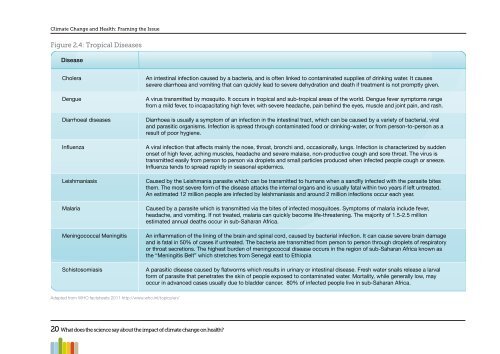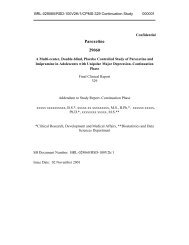Climate Change and Health: Framing the issue
Climate Change and Health: Framing the issue
Climate Change and Health: Framing the issue
You also want an ePaper? Increase the reach of your titles
YUMPU automatically turns print PDFs into web optimized ePapers that Google loves.
<strong>Climate</strong> <strong>Change</strong> <strong>and</strong> <strong>Health</strong> <strong>Health</strong>: <strong>Framing</strong> Paper <strong>the</strong> Issue<br />
Figure 2.4: Tropical Diseases<br />
Disease<br />
Cholera<br />
Dengue<br />
Diarrhoeal diseases<br />
Influenza<br />
Leishmaniasis<br />
Malaria<br />
Meningococcal Meningitis<br />
Schistosomiasis<br />
Adapted from WHO factsheets 2011 http://www.who.int/topics/en/<br />
020Introduction<br />
20 What does <strong>the</strong> science say about <strong>the</strong> impact of climate change on health?<br />
An intestinal infection caused by a bacteria, <strong>and</strong> is often linked to contaminated supplies of drinking water. It causes<br />
severe diarrhoea <strong>and</strong> vomiting that can quickly lead to severe dehydration <strong>and</strong> death if treatment is not promptly given.<br />
A virus transmitted by mosquito. It occurs in tropical <strong>and</strong> sub-tropical areas of <strong>the</strong> world. Dengue fever symptoms range<br />
from a mild fever, to incapacitating high fever, with severe headache, pain behind <strong>the</strong> eyes, muscle <strong>and</strong> joint pain, <strong>and</strong> rash.<br />
Diarrhoea is usually a symptom of an infection in <strong>the</strong> intestinal tract, which can be caused by a variety of bacterial, viral<br />
<strong>and</strong> parasitic organisms. Infection is spread through contaminated food or drinking-water, or from person-to-person as a<br />
result of poor hygiene.<br />
A viral infection that affects mainly <strong>the</strong> nose, throat, bronchi <strong>and</strong>, occasionally, lungs. Infection is characterized by sudden<br />
onset of high fever, aching muscles, headache <strong>and</strong> severe malaise, non-productive cough <strong>and</strong> sore throat. The virus is<br />
transmitted easily from person to person via droplets <strong>and</strong> small particles produced when infected people cough or sneeze.<br />
Influenza tends to spread rapidly in seasonal epidemics.<br />
Caused by <strong>the</strong> Leishmania parasite which can be transmitted to humans when a s<strong>and</strong>fly infected with <strong>the</strong> parasite bites<br />
<strong>the</strong>m. The most severe form of <strong>the</strong> disease attacks <strong>the</strong> internal organs <strong>and</strong> is usually fatal within two years if left untreated.<br />
An estimated 12 million people are infected by leishmaniasis <strong>and</strong> around 2 million infections occur each year.<br />
Caused by a parasite which is transmitted via <strong>the</strong> bites of infected mosquitoes. Symptoms of malaria include fever,<br />
headache, <strong>and</strong> vomiting. If not treated, malaria can quickly become life-threatening. The majority of 1.5-2.5 million<br />
estimated annual deaths occur in sub-Saharan Africa.<br />
An inflammation of <strong>the</strong> lining of <strong>the</strong> brain <strong>and</strong> spinal cord, caused by bacterial infection. It can cause severe brain damage<br />
<strong>and</strong> is fatal in 50% of cases if untreated. The bacteria are transmitted from person to person through droplets of respiratory<br />
or throat secretions. The highest burden of meningococcal disease occurs in <strong>the</strong> region of sub-Saharan Africa known as<br />
<strong>the</strong> “Meningitis Belt” which stretches from Senegal east to Ethiopia<br />
A parasitic disease caused by flatworms which results in urinary or intestinal disease. Fresh water snails release a larval<br />
form of parasite that penetrates <strong>the</strong> skin of people exposed to contaminated water. Mortality, while generally low, may<br />
occur in advanced cases usually due to bladder cancer. 80% of infected people live in sub-Saharan Africa.
















